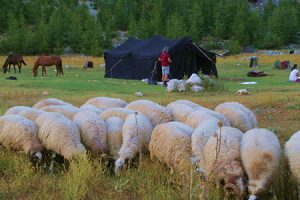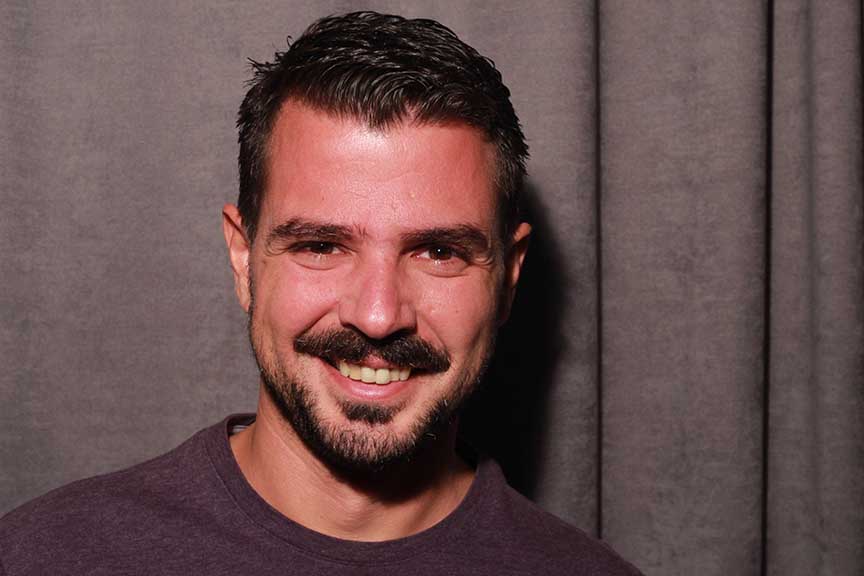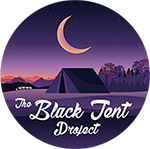The Black Tent
The Black Tent, made of goat hair, spun and woven by hands of masters, has portable, waterproof, collapsable, anti-reptile and anti-insect properties. Animals such as snakes and scorpions cannot walk on the tent cloth. Building our story, we decided that a black tent woven by carpet weavers would be perfectly suitable to make textile tours and for adventures of trekking in Turkey.
“One horse can carry the whole load of the black tent, however, 40 horses cannot carry its joy.”
 The Black Tent, woven by carpet weavers, weighs 160 kgs (350 lbs) with its roof of 24 m2, four dismountable walls, and inner ground coverage. It is constructed on 9 poles of several lengths and loaded on horseback during daily migrations. It is possible to set up The Black Tent within 30 minutes, including the placing of the whole household in the tent. In fact, the black tent is a complete house with all the facilities included, and can be dismantled, and reconstructed on the same day in a different place.
The Black Tent, woven by carpet weavers, weighs 160 kgs (350 lbs) with its roof of 24 m2, four dismountable walls, and inner ground coverage. It is constructed on 9 poles of several lengths and loaded on horseback during daily migrations. It is possible to set up The Black Tent within 30 minutes, including the placing of the whole household in the tent. In fact, the black tent is a complete house with all the facilities included, and can be dismantled, and reconstructed on the same day in a different place.
The Black Tent is 4 meters by 6 meters and can host eight people during the day and at night. The goat hair textile, which forms the tent, is waterproof and provides insolation of 10°C cooler or warmer according to the weather conditions.
At night the tent is divided into four sections for people to sleep in. Each section is 2 meters by 3 meters and will be divided by special handwoven textiles.
The Black Tent Project is an interactive, experimental and a socio-cultural research tour on nomadic culture and ethnicity, and one of the major aims of this project is to sustain the traditional way of life of nomads of Anatolia who came from Central Asia with their own unique culture and who are wandering in Anatolian lands for the last 1000 years.
In order to preserve and sustain the Anatolian nomadic culture, all of the materials used during the nomadic adventure are carefully created by staying loyal to the original methods of production. All of the textiles used in the nomadic adventure are dyed by natural materials such as herbs and woven by the hands of carpet weavers. This includes the black tent itself, the “perdehs” to be used as room separators, and the nomadic sacks.
Write Us
Preparation of nomadic bread in Subasi Pasture at 2,100 meters of altitude. One of our guests tries to take photos of the goat flock is on its way back to home for the night, our black tent crew is preparing to welcome the pasture night with meals and music. The night in the pasture is animated from time to time by nomads visiting our camp for some tea and talk.
Deniz Coşkun (Tour Leader)

Born in 1980 in Istanbul, Deniz met the fascinating world of oriental carpets in 1992, while he was studying in one of the respected French high schools in Istanbul.
Deniz specialized in studying hand weaving and natural dyeing, while he was also studying Chemical Engineering in university. When he completed his MBA degree, he pursued his dreams to specialize in nomadic cottage and semi-nomadic village weavings by studying the subject with scholars and expert dealers.
Fascinated by Anatolian Turkmen nomads’ weaving style, he traveled through central Anatolia and the Taurus Mountains and lived among some Turkmen tribes for a while. He closely examined continuing tribal and ethnic social structures of Anatolia since the Ottoman era, and presented comprehensive studies mostly centered upon “weavings and textiles”.
Deniz gives speeches at international textile events, and mentors in natural dyeing and international weaving courses. Now he dedicates himself to organizing cultural and textile-oriented walking and hiking adventures in Anatolia. When you join him on one of his cultural adventures, you will not only experience great cultural contacts with Anatolian rural people, but also enjoy the amazing countryside landscape with traditional Anatolian cuisine, which has descended from peoples of the Ottoman empire.
Contact mail: beyondeniz@gmail.com
Phone: +90 533 525 0726








